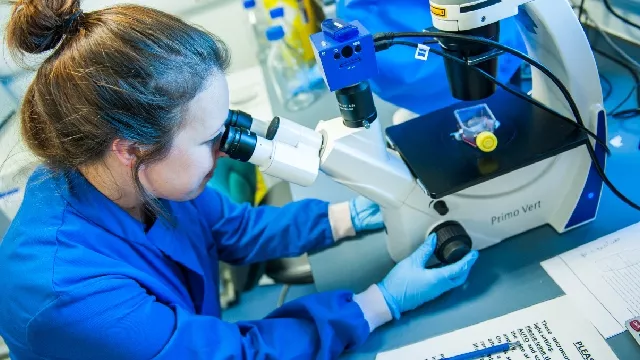
We’re putting the spotlight on one of our many inspirational female researchers, who is working to improve the care of women with diabetes during pregnancy, to mark International Day of Women and Girls in Science.
Professor Melissa Westwood is a professor of endocrinology at University of Manchester. “I started my research career investigating diabetic neuropathy but a chance finding led me into the world of reproductive biomedicine,” says Professor Westwood.
“Happily, now I get to combine by two interests by trying to help women with diabetes have the best pregnancy outcome possible.”
With our funding she’s investigating how high blood sugar levels affects the way the placenta works during pregnancy.
Baby on board
Women with diabetes are more likely to have larger babies, which increases the risk of complications for both mother and baby during birth, as well as health problems for the child later in life.
Professor Westwood explained, “We work on the placenta, which forms the physical connection between mother and child, transferring food and oxygen to supply the growing fetus.
“At the start of pregnancy, the embryo makes its first contact with the womb and starts to burrow under the surface. At this stage, the womb gives instructions to the embryo that affect how the placenta develops.
“We think that in mothers with diabetes, the instructions are different if her sugar levels are high at this crucial time, and that changes the placenta’s blueprint and the way it works throughout the rest of pregnancy.”
This causes the placenta to transfer too many nutrients, and the baby to grow larger. Professor Westwood is exploring how high blood sugar levels in mice during the early stages of pregnancy affect how the placenta develops and transfers nutrients, and how it affects the weight of the newborn mice. After the pregnancy, she will then track the long-term health of the offspring, looking at their blood sugar levels, insulin levels and body weight.
“If our research goes well, we hope we will be able to develop interventions to help women better prepare for pregnancy," says Professor Westwood.
“Looking to the future of care, I want to see all women with diabetes getting good pre-pregnancy advice and support. Hopefully the new technologies, such as closed-loop systems and continuous glucose monitoring, will help with that.”
“I’m so grateful to everyone who supports Diabetes UK – we simply wouldn’t be able to do our research without your generosity. Thank you.”
Melissa's interests outside the lab
Professor Westwood also shared what she gets up to when not in the lab. “In my free time I enjoy running. I’m currently training for the Manchester marathon. I’m also learning Italian, sadly just on Duolingo so far (623 day streak and counting). But I do hope to go for some face-to-face classes soon. And I keep chickens. I have six at the moment – all named after characters in Chicken Run”, she said.
We’re proud of the achievements of all our amazing female scientists, who have had a huge impact on the lives of people with diabetes and continue to lead the way in life-changing research.
